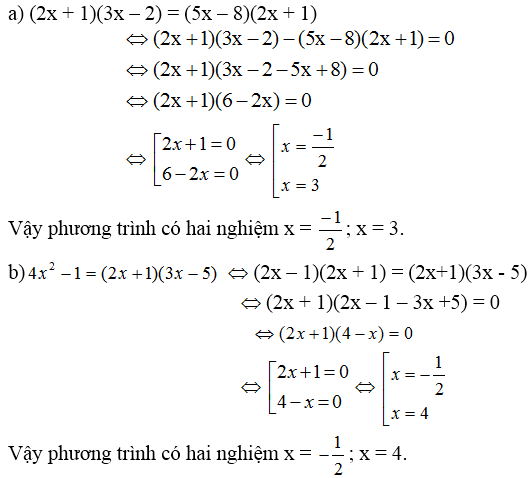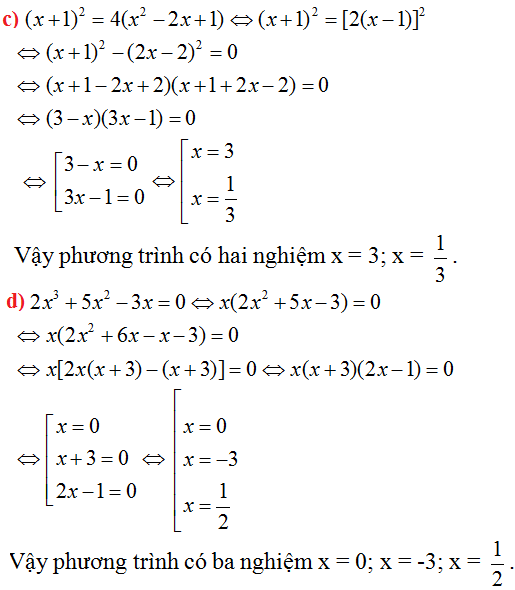Hãy nhập câu hỏi của bạn vào đây, nếu là tài khoản VIP, bạn sẽ được ưu tiên trả lời.

a) <=> 3x-2=0 hoặc 4x+5=0
1) 3x-2=0 <=> 3x=2 <=> x=2/3
2) 4x+5=0 <=> 4x=-5 <=> x= -5/4

Bài 3:
a) \(\left(x-6\right).\left(2x-5\right).\left(3x+9\right)=0\)
\(\Leftrightarrow\left(x-6\right).\left(2x-5\right).3.\left(x+3\right)=0\)
Vì \(3\ne0.\)
\(\Leftrightarrow\left[{}\begin{matrix}x-6=0\\2x-5=0\\x+3=0\end{matrix}\right.\Leftrightarrow\left[{}\begin{matrix}x=6\\2x=5\\x=-3\end{matrix}\right.\Leftrightarrow\left[{}\begin{matrix}x=6\\x=\frac{5}{2}\\x=-3\end{matrix}\right.\)
Vậy phương trình có tập hợp nghiệm là: \(S=\left\{6;\frac{5}{2};-3\right\}.\)
b) \(2x.\left(x-3\right)+5.\left(x-3\right)=0\)
\(\Leftrightarrow\left(x-3\right).\left(2x+5\right)=0\)
\(\Leftrightarrow\left[{}\begin{matrix}x-3=0\\2x+5=0\end{matrix}\right.\Leftrightarrow\left[{}\begin{matrix}x=3\\2x=-5\end{matrix}\right.\Leftrightarrow\left[{}\begin{matrix}x=3\\x=-\frac{5}{2}\end{matrix}\right.\)
Vậy phương trình có tập hợp nghiệm là: \(S=\left\{3;-\frac{5}{2}\right\}.\)
c) \(\left(x^2-4\right)-\left(x-2\right).\left(3-2x\right)=0\)
\(\Leftrightarrow\left(x^2-2^2\right)-\left(x-2\right).\left(3-2x\right)=0\)
\(\Leftrightarrow\left(x-2\right).\left(x+2\right)-\left(x-2\right).\left(3-2x\right)=0\)
\(\Leftrightarrow\left(x-2\right).\left(x+2-3+2x\right)=0\)
\(\Leftrightarrow\left(x-2\right).\left(3x-1\right)=0\)
\(\Leftrightarrow\left[{}\begin{matrix}x-2=0\\3x-1=0\end{matrix}\right.\Leftrightarrow\left[{}\begin{matrix}x=2\\3x=1\end{matrix}\right.\Leftrightarrow\left[{}\begin{matrix}x=2\\x=\frac{1}{3}\end{matrix}\right.\)
Vậy phương trình có tập hợp nghiệm là: \(S=\left\{2;\frac{1}{3}\right\}.\)
Chúc bạn học tốt!

\(a,2x\left(x-3\right)+5\left(x-3\right)=0\)
\(\Leftrightarrow\left(2x+5\right)\left(x-3\right)=0\)
\(\Leftrightarrow\orbr{\begin{cases}2x+5=0\\x-3=0\end{cases}}\Leftrightarrow\orbr{\begin{cases}2x=-5\\x=3\end{cases}}\Leftrightarrow\orbr{\begin{cases}x=-\frac{5}{2}\\x=3\end{cases}}\)
Vậy .........
\(b,\left(x^2-4\right)+\left(x-2\right)\left(3-2x=0\right)\)
\(\Leftrightarrow x^2-4-2x^2+7x-6=0\)
\(\Leftrightarrow-x^2+7x-10=0\)
\(\Leftrightarrow-\left(x-5\right)\left(x-2\right)=0\)
\(\Leftrightarrow\orbr{\begin{cases}x=5\\x=2\end{cases}}\)
Vậy ..................
\(c,x^3-3x^2+3x-1=0\)
\(\Leftrightarrow\left(x-1\right)^3=0\)
\(\Leftrightarrow x=1\)
\(d,x\left(2x-7\right)-4x+14=0\)
\(\Leftrightarrow2x^2-7x-4x+14=0\)
\(\Leftrightarrow2x^2-11x+14=0\)
\(\Leftrightarrow\left(2x-7\right)\left(x-2\right)=0\)
\(\Leftrightarrow\orbr{\begin{cases}x=\frac{7}{2}\\x=2\end{cases}}\)
Vậy ............
\(e,\left(2x-5\right)^2-\left(x+2\right)^2=0\)
\(\Leftrightarrow4x^2-20x+25-x^2-4x-4=0\)
\(\Leftrightarrow3x^2-24x+21=0\)
\(\Leftrightarrow3\left(x-7\right)\left(x-1\right)=0\)
\(\Leftrightarrow\orbr{\begin{cases}x-7=0\\x-1=0\end{cases}}\Leftrightarrow\orbr{\begin{cases}x=7\\x=1\end{cases}}\)
Vậy .....................
\(f,x^2-x-\left(3x-3\right)=0\)
\(\Leftrightarrow x^2-x-3x+3=0\)
\(\Leftrightarrow x^2-4x+3=0\)
\(\Leftrightarrow\left(x-3\right)\left(x-1\right)=0\)
\(\Leftrightarrow\orbr{\begin{cases}x-3=0\\x-1=0\end{cases}}\Leftrightarrow\orbr{\begin{cases}x=3\\x=1\end{cases}}\)
Vậy ..............

Theo đề bài ta có :
\(\frac{x\left(3-x\right)}{x+1}\cdot\left(x+\frac{\left(3-x\right)}{x+1}\right)=2\)
=> \(\frac{\left(3x-x^2\right)}{x+1}\cdot\frac{\left(3-x+x^2+x\right)}{x+1}=2\)
=> \(\left(3x-x^2\right)\left(x^2+3\right)=2\left(x+1\right)^2\)
=> \(3x^3+9x-x^4-3x^2=2x^2+4x+2\)
=> \(3x^3+\left(9x-4x\right)+\left(-3x^2-2x^2\right)-x^4-2=0\)
=> \(3x^3+5x-5x^2-x^4-2=0\)
=> \(5x\left(1-x\right)+x^3\left(1-x\right)+2\left(x^3-1\right)=0\)
=> \(5x\left(1-x\right)+x^3\left(1-x\right)+2\left(x-1\right)\left(x^2+x+1\right)=0\)
=> \(5x\left(1-x\right)+x^3\left(1-x\right)-2\left(1-x\right)\left(x^2+x+1\right)=0\)
=> \(\left(1-x\right)\left(5x+x^3-2x^2-2x-2\right)=0\)
=> \(\left(1-x\right)\left(3x+x^3-2x^2-2\right)=0\)
=> \(\left(1-x\right)\left(x^3-x^2-x^2+x+2x-2\right)=0\)
=> \(\left(1-x\right)\left(x^2\left(x-1\right)-x\left(x-1\right)+2\left(x-1\right)\right)=0\)
=> \(\left(1-x\right)\left(x-1\right)\left(x^2-x+2\right)=0\)
Ta Thấy :
\(\left(x^2-x+2\right)=\left(x-\frac{1}{2}\right)^2+\frac{7}{4}>0\)
=> \(\hept{\begin{cases}1-x=0\\x-1=0\end{cases}}\)
=> x = 1

a)(2x+1)(3x-2)=(5x-8)(2x+1)
⇔(2x+1)(3x-2)-(5x-8)(2x+1)=0
⇔(2x+1)(3x-2-5x+8)=0
⇔(2x+1)(-2x+6)=0
⇔2x+1=0 hoặc -2x+6=0
1.2x+1=0⇔2x=-1⇔x=-1/2
2.-2x+6=0⇔-2x=-6⇔x=3
phương trình có 2 nghiệm x=-1/2 và x=3

1 )
<=> 4(x2+2x+1) + (4x2 -4x +1) - 8(x2 -1) =11
<=>4x2 + 8x + 4 + 4x2 -4x +1 -8x2 +8 = 11
<=> 4x + 13 =11 <=> 4x = -2
=> x =\(\frac{-1}{2}\)


a: =>x+3=x-2 hoặc x+3=2-x
=>2x=-1
=>x=-1/2
b: =>3x+7=x-2 hoặc 3x+7=-x+2
=>2x=-9 hoặc 4x=-5
=>x=-5/4 hoặc x=-9/2
c: =>|3x-4|=|2x-5|
=>3x-4=2x-5 hoặc 3x-4=-2x+5
=>x=-1 hoặc x=9/5